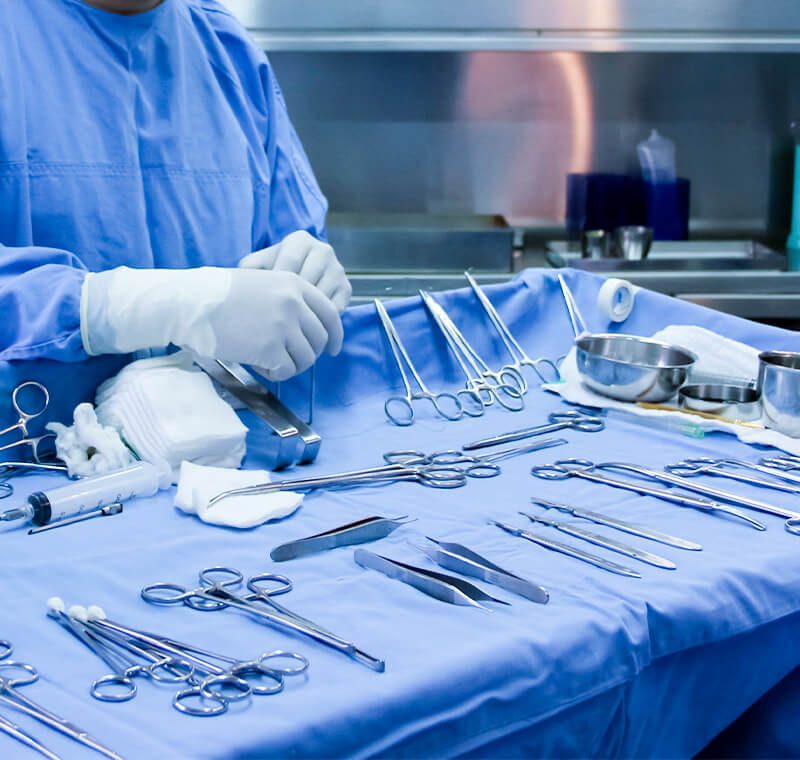ST 9000
Surgical/Sterile Processing Technician
Gain industry certification as a Sterile Processing Technician and ultimately work in hospitals, surgery centers, clinics and other healthcare facilities.
Program Overview
Certifications earned
What Does a Surgical/Sterile Processing Technician Do?
A Surgical/Sterile Processing Technician receives, documents, packages, sterilizes, stores, and/or issues instruments, equipment, and supplies for patient care. In addition to the sterile processing responsibilities, the technician must also be able to assist in the care of patients of all ages before, during, and after surgical procedures by performing scrub duties and related functions as a member of the surgical team. The technician maintains patient safety, privacy, and confidentiality, and complies with legal aspects of patient care. The technician complies with sterilization standards for handling sharp or contaminated instruments.
- Demonstrate an understanding of the soft skill expectations of an allied healthcare professional
- Grasp the importance of customer service, communication skills and professionalism
- Sterilize medical equipment and instruments
- Support the needs of the surgeon
- Clean, decontaminate and disinfection
- Documentation and records management
- Distinguish preoperative, intraoperative and postoperative duties
What You’ll Learn – ST 9000 Surgical/Sterile Processing Technician
In the Surgical/Sterile Processing Technician program, students will complete modules relating to professionalism in the healthcare setting, human anatomy, and medical terminology, and will cover the fundamentals of sterile processing and surgical technologist tools and procedures.
Students will be prepared for the Tech In Surgery Certification (TS-C) offered by the NCCT and the optional Certified Registered Central Services Technician (CRCST) certification offered by the HSPA.
Both certifications require the completion of hands-on clinical experience. TS-C candidates must complete and log a minimum of 125 surgical cases, which must be completed and reported to NCCT within two (2) years of passing the TS-C exam. Students are required to have a verified clinical site before enrolling in this program.
CRCST students must complete 400 hours of hands-on experience in a Central Services department within 6 months of passing the CRCST exam. Students are responsible for securing their clinical site to complete these requirements.
We strongly advise students to research target job posts from area employers and relevant state requirements, barriers, or restrictions prior to enrollment to ensure eligibility upon graduation.
Note: Some MedCerts programs are restricted in certain states or regions. Please review our State Restriction page to view what restrictions there may be in your state/region or residence of employment and ensure you are eligible for enrollment.
View More
Not Sure if Surgical/Sterile Processing Technician Training is Right For You?
Take our easy 2 minute Career Quiz!
Find your next careerSome MedCerts programs are restricted in certain states or regions. Please review our State Restriction page to see what restrictions there may be in your state/region or residence of employment to ensure you are eligible for enrollment.
These restrictions may not apply to students taking programs through an employer, academic or government-sponsored model – including MyCAA, GI Bill® Reimbursement and Army, Air Force or Coast Guard Credentialing Assistance. To determine eligibility, please confirm with your sponsor or review our military spouse MyCAA-approved or Military Credentialing Assistance-approved programs
Program Details
- Web browser with internet connection
- Course registration & payment
- English language proficiency
- Employer/Clinical Sponsorship – Applicants to these programs MUST provide verification that an Employer or Clinical Site has agreed to accept the applicant in efforts to fulfill “surgical case” requirements required for Tech in Surgery (TS-C) certification before enrollment. With this Sponsorship, the student must be guaranteed to perform a minimum of required surgical cases completed and reported to NCCT within two (2) years of passing the TS-C exam.
- The MedCerts Student Clinical Site Information Form must be submitted to MedCerts prior to enrollment.
- Expert-led video based training
- Competency assessments
- National Certification exam fee
- National Certification exam fee
*The cost of all materials needed for this program are covered by MedCerts. They are not included in the tuition costs and are provided at no additional cost to students. However, students have access to these materials for a limited time frame aligned with their program. Access to these materials outside of this period is not guaranteed, and students may be responsible for costs associated with any extended access.
- Dedicated Student Success Advisors
- Tailored support based on performance & behavior
- Exam preparation process
- Career Services Advisor
- CRCST requirements: 400 hours of hands-on experience in a Central Services Department within 6 months of passing the exam. Please visit the HSPA website for a breakdown of the specific disciplines.
- TS-C requirements: 125 surgical cases completed within two years of passing the TS-C exam. Please visit the NCCT website for a breakdown of the specific cases required. NOTE: Sponsorship Acknowledgement Form must be signed by the clinical site agreeing to host the student for post program surgical cases before student can enroll.
Career Outlook

Surgical/Sterile Processing Technician
Job Opportunities
openings in the US
potential
Tuition Cost
Monthly, weekly and bi-weekly payment plan options are available. These payment plans include a 3.5% fee per transaction. Students who choose to pay in full will not be charged the transaction fee.
Active Duty Military Grants
MedCerts accepts education benefits from the Department of Defense for Active Duty Army, Coast Guard and Air Force and the Department of Veteran’s Affairs for GI Bill® Reimbursement.
Military Spouse Grants
Spouses of Active Duty Service Members in certain ranks may be eligible for assistance up to $2,000 per fiscal year or reimbursement for training.
Workforce Grants
MedCerts partners with American Job Centers in 30+ states and accepts Workforce Innovation and Opportunity Act (WIOA) and other workforce grant funding.
Veteran Grants
Veterans, active-duty service members and eligible dependents can enroll in select MedCerts training programs and receive reimbursement through the GI Bill® upon successful completion.
FAQs
Surgical/Sterile Processing Technician Online Certification Training Program—Frequently Asked Questions
A Surgical/Sterile Processing Technician is responsible for sterilizing, packaging, and managing surgical instruments and equipment. They work in hospitals, surgery centers, and clinics, ensuring that all surgical tools are properly cleaned, decontaminated, and stored. They also assist in the care of patients before, during, and after surgical procedures by performing scrub duties and related tasks
The career outlook for Surgical/Sterile Processing Technicians is very positive, with available jobs expected to grow by 5% over the next ten years.
Salaries can range from $37,000 to $101,000 annually, depending on experience, location, and the specific office or clinic.
To start your career journey as a Surgical/Sterile Processing Technician,, you need a high school diploma or equivalent, provide the Sponsorship Acknowledgement form signed by prospective employer agreeing to host the graduate for post-program surgical cases (scrubs) as a full-time/part-time employee, extern, or apprentice (required to attain TS-C certification), complete a formal training program such as MedCerts, pass the TS-C exam offered by the National Center for Competency Testing, and the CRCST exam offered by the Healthcare Sterile Processing Association. Students who pass the TS-C exam are required to complete the following hands-on requirements within two years of passing the NCCT exam. Students are responsible for securing their clinical sites:
- A minimum of 30 (maximum of 50) scrubs in general surgeries and
- Minimum of 75 scrubs in at least three (3) of the following areas
- Gynecology
- Genitourinary
- Cardiovascular
- Neurosurgery
- Obstetrics
- Thoracic
- Peripheral Vascular
- Ophthalmology
- Otorhinolaryngology
- Plastic/Reconstructive
- Other (please specify)
- Orthopedic
- Diagnostic Scopes (Maximum of 15)
Students who pass the CRCST exam are required to complete a total of 400 hours of hands-on experience in a Central Services (CS) department in the following categories. Students are responsible for securing their clinical sites:
- Decontamination (120 hours)
- Quality Assurance Processes (24 hours)
- Preparing and Storing Instruments (120 hours)
- Storage and Distribution (24 hours)
- Sterilization and Disinfection (96 hours)
- Equipment (16 hours)
In the MedCerts online Surgical/Sterile Processing Technician training program, you will learn a comprehensive range of skills, including sterilization techniques, surgical instrument management, decontamination procedures, surgical suite preparation, infection control, patient care during surgical procedures, legal and health regulations compliance, and maintaining surgical equipment.
To enroll in the MedCerts Surgical/Sterile Processing Technician training program, you need a web browser with an internet connection, course registration and payment and verification of an Employer or Clinical Sponsorship. This sponsorship must confirm the applicant can fulfill the “surgical case” requirements for the Tech in Surgery (TS-C) certification. Additionally, the MedCerts Student Clinical Site Form must be submitted prior to enrollment.
Tuition is competitively priced at $6,000. The cost includes all of your materials and registration fees for your CRCST and TS-C examinations.
Yes, payment plans are available as low as $519 per month. Additionally, students may qualify for government funding and scholarships.
While MedCerts does not offer financial aid, students may be eligible for options through government grant-funded programs like:
The total program duration is 24 weeks if completing 15-20 hrs of coursework per week.
The program is developed with collaboration from industry-recognized subject matter experts and includes interactive simulations, interviews with real-world experts, game-based learning, and more, catering to every type of learner.
Yes, the program includes a strategic exam preparation process and dedicated Student Success Advisors to provide tailored support based on performance.
The program includes expert-led video-based training, competency assessments, and the national certification exam fee. All materials needed for the program are covered by MedCerts.
Some MedCerts programs are restricted in certain states or regions. Please review our State Restriction page to view what restrictions there may be in your state/region or residence of employment and ensure you are eligible for enrollment.
We’re not institutionally accredited as a training provider, but the certifications you’ll earn in this program are accredited through the exam-issuing authorities, the NCCT and HSPA. So while our school itself doesn’t hold accreditation, you’ll earn an accredited certification upon passing your national exams and completing clinical requirements.
To become fully certified, students who pass the TS-C exam are required to complete the following hands-on requirements within two years of passing the NCCT exam. Students are responsible for securing their clinical sites:
- A minimum of 30 (maximum of 50) scrubs in general surgeries and
- Minimum of 75 scrubs in at least three (3) of the following areas
- Gynecology
- Genitourinary
- Cardiovascular
- Neurosurgery
- Obstetrics
- Thoracic
- Peripheral Vascular
- Ophthalmology
- Otorhinolaryngology
- Plastic/Reconstructive
- Other (please specify)
- Orthopedic
- Diagnostic Scopes (Maximum of 15)
To become fully certified, students who pass the CRCST exam are required to complete a total of 400 hours of hands-on experience in a Central Services (CS) department in the following categories. Students are responsible for securing their clinical sites:
- Decontamination (120 hours)
- Quality Assurance Processes (24 hours)
- Preparing and Storing Instruments (120 hours)
- Storage and Distribution (24 hours)
- Sterilization and Disinfection (96 hours)
- Equipment (16 hours)
Disclaimers
- While MedCerts training and related target certifications may be accepted and/or approved by your state of residency, employers reserve the right to dictate pre-requisite education, experience, or certification/licensure requirements for their positions. We strongly advise students to research target job posts from area employers and relevant state requirements, barriers, or restrictions prior to enrollment to ensure eligibility upon graduation.

